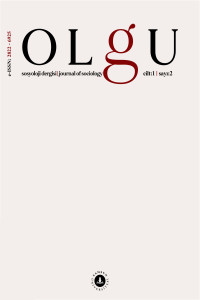Abstract
Although Greece, located in the Balkan geography, reflects the characteristics of a homogeneous state on a large scale, this should not mean that different elements do not live within the borders of the country. in Greece. Population data of these groups has always been the subject of discussion. Although various population data are presented about these ethnic and religious elements, this subject always contains a question mark. Because the significant difference between the data of official Greek sources and the data of unofficial sources strengthens this question mark. Therefore, although Greece expresses itself as a homogeneous state, the multicultural nature of this heterogeneity continues to exist. It does not take into account the properties of many different elements. This policy of Greece is exempt. Especially in education, the design of Greece is an experience for Western Thrace. Restricting Turkish education every day, making education education educable and training education in Turkey gives an idea about the Turkish elements of Greece. At this stage, the solution proposal of our study is that Greece should bring its multiculturalism policies to the fore and expand it. In this respect, it prioritizes horizontal relationship networks rather than vertical networks. In this study, the education policies of Greece and how these policies are reflected in minority education will be discussed.
References
- Ahmet, İ. K. (2006). Yunanistan’da (Batı Trakya’da) azınlık eğitim sistemi içinde İkidilli (Türkçe-Yunanca) azınlık ilkokulları. Türk Dünyası İncelemeleri Dergisi. 6 (1).
- Akyüz, B. (2007). Batı Trakya Türk toplumunun eğitim ve öğretim problemleri. (Yayınlanmamış yüksek lisans tezi). Sakarya Üniversitesi. Sakarya.
- Aydın-Koyuncu, Ç. (2018). Yunanistan’daki Makedon azınlık sorununun Yunan ulus inşa süreci bağlamında analizi. Yönetim ve Ekonomi Araştırmaları Dergisi. 16 (4).
- Chairoula, P. (2018). Balkan savaşlarından sonra Batı Trakya Türklerinin sosyo-kültürel hayatı ve eğitim tarihi. Edirne.
- Hakses, M. (1988). Batı Trakya’da anaokulları. Batı Trakyanın Sesi Dergisi. 3. İstanbul.
- Hüseyinoğlu, A. (2012). The develoment of minority education at the South-easternmost Corner of the EU: The case of Muslim Turks in Western Thrace. İngiltere. İsmail, A. (2012). Yunanistan’da azınlık hakları: Batı Trakya Türk azınlığı örneği. (Yayınlanmamış yüksek lisans tezi). Ankara Üniversitesi. Ankara.
- Oran, B. (1991). Türk-Yunan ilişkilerinde Batı Trakya sorunu. Ankara: Bilgi Yayınevi
- Oran, B. (1992). Türkiye’de Azınlıklar. Ankara: İletişim Yayınları
- Özensel, E. (2013). Doğu toplumlarında ve Türkiye’de birlikte yaşama arayışı: Çokkültürlülük mü? Yoksa yeni bir model mi?. Akademik İncelemeler Dergisi. 8 (3).
- Özensel, E. (2012). Çokkültürlülük uygulaması olarak Kanada çokkültürlülüğü. Akademik İncelemeler Dergisi. 7 (1).
- Tsaous, A. (2021). Batı Trakya azınlık okulları eğitim durumları ve yasal çerçevenin incelenmesi. (Yayınlanmamış yüksek lisans tezi). Eskişehir Osmangazi Üniversitesi. Eskişehir.
- T.C. Dışişleri Bakanlığı (2022). Yunanistan’daki Türk varlığı. Erişim Tarihi: 19.06.2022 https://www.mfa.gov.tr/bati-trakya-turk-azinligi.tr.mfa
Abstract
Balkan coğrafyasında yer alan Yunanistan, büyük ölçekte homojen bir devlet özelliğini yansıtsa da esasında farklı etnik ve kültürel yapıların yaşadığı bir ülkedir. Söz konusu grupların nüfus verileri her dönem tartışma konusu olmuştur. Çalışmamızın sınırları bağlamında Batı Trakya bölgesinde yaşayan Türklerin de Yunanistan’ın bu politikalarına maruz kaldığı söylenebilir. Özellikle eğitim konusunda Yunanistan’ın izlediği politikalar Batı Trakya bölgesinde yaşayan Türk halkının kimliğini yok saymaya yöneliktir. Türkçe eğitim dilini her geçen gün kısıtlamak, Yunanca eğitim dilini daha görünür kılmak ve Türkiye’de eğitim alan öğrencileri yeterince desteklememek, Yunanistan’ın Türk unsurlara yönelik tutumu hakkında fikir vermektedir. Bu çalışma, Yunanistan’ın homojenleştirici eğitim politikalarının yerine çokkültürlü eğitim politikalarının tesis edilerek yaygınlaştırılması önerisini sunmaktadır. Bu çalışmada Yunanistan’ın eğitim politikaları ve bu politikaların azınlık eğitimine ne şekilde yansıdığı ele alınacak ayrıca Yunanistan’daki çokkültürlü eğitimin imkanlarını eğitim-öğretim kademeleri örnekliğinde açıklamaya çalışacaktır.
References
- Ahmet, İ. K. (2006). Yunanistan’da (Batı Trakya’da) azınlık eğitim sistemi içinde İkidilli (Türkçe-Yunanca) azınlık ilkokulları. Türk Dünyası İncelemeleri Dergisi. 6 (1).
- Akyüz, B. (2007). Batı Trakya Türk toplumunun eğitim ve öğretim problemleri. (Yayınlanmamış yüksek lisans tezi). Sakarya Üniversitesi. Sakarya.
- Aydın-Koyuncu, Ç. (2018). Yunanistan’daki Makedon azınlık sorununun Yunan ulus inşa süreci bağlamında analizi. Yönetim ve Ekonomi Araştırmaları Dergisi. 16 (4).
- Chairoula, P. (2018). Balkan savaşlarından sonra Batı Trakya Türklerinin sosyo-kültürel hayatı ve eğitim tarihi. Edirne.
- Hakses, M. (1988). Batı Trakya’da anaokulları. Batı Trakyanın Sesi Dergisi. 3. İstanbul.
- Hüseyinoğlu, A. (2012). The develoment of minority education at the South-easternmost Corner of the EU: The case of Muslim Turks in Western Thrace. İngiltere. İsmail, A. (2012). Yunanistan’da azınlık hakları: Batı Trakya Türk azınlığı örneği. (Yayınlanmamış yüksek lisans tezi). Ankara Üniversitesi. Ankara.
- Oran, B. (1991). Türk-Yunan ilişkilerinde Batı Trakya sorunu. Ankara: Bilgi Yayınevi
- Oran, B. (1992). Türkiye’de Azınlıklar. Ankara: İletişim Yayınları
- Özensel, E. (2013). Doğu toplumlarında ve Türkiye’de birlikte yaşama arayışı: Çokkültürlülük mü? Yoksa yeni bir model mi?. Akademik İncelemeler Dergisi. 8 (3).
- Özensel, E. (2012). Çokkültürlülük uygulaması olarak Kanada çokkültürlülüğü. Akademik İncelemeler Dergisi. 7 (1).
- Tsaous, A. (2021). Batı Trakya azınlık okulları eğitim durumları ve yasal çerçevenin incelenmesi. (Yayınlanmamış yüksek lisans tezi). Eskişehir Osmangazi Üniversitesi. Eskişehir.
- T.C. Dışişleri Bakanlığı (2022). Yunanistan’daki Türk varlığı. Erişim Tarihi: 19.06.2022 https://www.mfa.gov.tr/bati-trakya-turk-azinligi.tr.mfa
Details
| Primary Language | Turkish |
|---|---|
| Subjects | Sociology |
| Journal Section | Research Articles |
| Authors | |
| Publication Date | December 26, 2022 |
| Submission Date | June 22, 2022 |
| Published in Issue | Year 2022 Volume: 1 Issue: 2 |


